Related Research Articles

Manitoba is a province of Canada at the longitudinal centre of the country. It is Canada's fifth-most populous province, with a population of 1,342,153 as of 2021. Manitoba has a widely varied landscape, from arctic tundra and the Hudson Bay coastline in the north to dense boreal forest, large freshwater lakes, and prairie grassland in the central and southern regions.
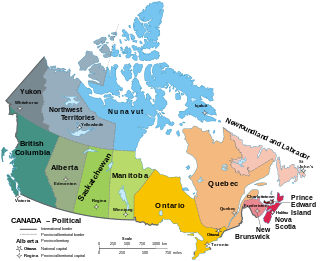
Canada has ten provinces and three territories that are sub-national administrative divisions under the jurisdiction of the Canadian Constitution. In the 1867 Canadian Confederation, three provinces of British North America—New Brunswick, Nova Scotia, and the Province of Canada —united to form a federation, becoming a fully independent country over the next century. Over its history, Canada's international borders have changed several times as it has added territories and provinces, making it the world's second-largest country by area.
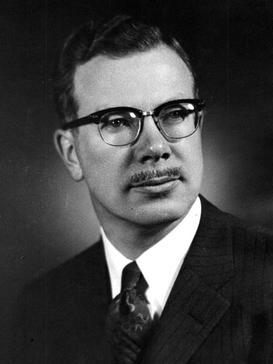
Dufferin "Duff" Roblin was a Canadian businessman and politician. He served as the 14th premier of Manitoba from 1958 to 1967. Roblin was appointed to the Senate of Canada on the advice of Prime Minister Pierre Trudeau. In the government of Brian Mulroney, he served as government leader in the Senate. He was the grandson of Sir Rodmond Roblin, who also served as Manitoba Premier. His ancestor John Roblin served in the Upper Canada assembly.
The Progressive Party of Canada, formally the National Progressive Party, was a federal-level political party in Canada in the 1920s until 1930. It was linked with the provincial United Farmers parties in several provinces, and it spawned the Progressive Party of Saskatchewan, and the Progressive Party of Manitoba, which formed the government of that province. The Progressive Party was part of the farmers' political movement that included federal and provincial Progressive and United Farmers' parties.
There have been various groups in Canada that have nominated candidates under the label Labour Party or Independent Labour Party, or other variations from the 1870s until the 1960s. These were usually local or provincial groups using the Labour Party or Independent Labour Party name, backed by local labour councils made up of many union locals in a particular city, or individual trade unions. There was an attempt to create a national Canadian Labour Party in the late 1910s and in the 1920s, but these were only partly successful.

The 2003 Manitoba general election was held on June 3, 2003 to elect Members of the Legislative Assembly of the Province of Manitoba, Canada. It was won by the New Democratic Party, which won 35 seats out of 57, securing another term for premier Gary Doer.

John Bracken was a Canadian agronomist and politician who was the 11th and longest-serving premier of Manitoba (1922–1943) and later the leader of the Progressive Conservative Party of Canada (1942–1948).
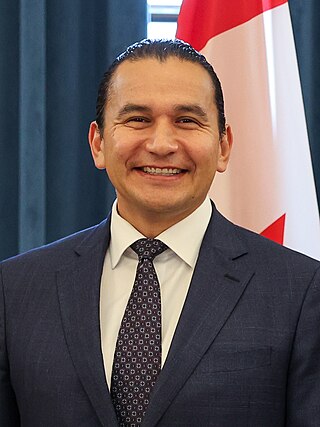
The premier of Manitoba is the first minister for the Canadian province of Manitoba—as well as the de facto President of the province's Executive Council.

The Manitoba Liberal Party is a political party in Manitoba, Canada. Its roots can be traced to the late 19th century, following the province's creation in 1870.
The Progressive Conservative Party of Manitoba is a centre-right political party in Manitoba, Canada. It is currently the opposition party in the Legislative Assembly of Manitoba, following a defeat in the 2023 provincial election.
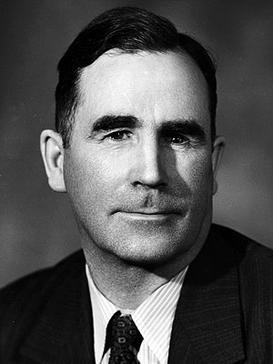
Douglas Lloyd Campbell was a Canadian politician in Manitoba. He served as the 13th premier of Manitoba from 1948 to 1958. He was a member of the Legislative Assembly of Manitoba for 47 years, longer than anyone in the province's history.
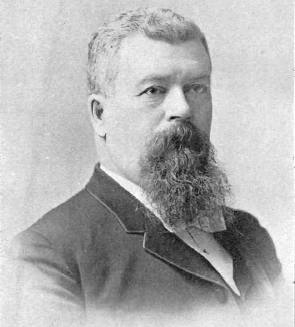
Thomas Greenway was a Canadian politician, merchant and farmer. He served as the seventh premier of Manitoba from 1888 to 1900. A Liberal, his ministry formally ended Manitoba's non-partisan government, although a de facto two-party system had existed for some years.

The Communist Party of Canada – Manitoba is the provincial wing of the Communist Party of Canada for the province of Manitoba. Founded in 1921, it was an illegal organization for several years and its meetings were conducted with great secrecy. Until 1924, the "Workers Party" functioned as its public, legal face. For a period in the 1920s, the party was associated with the Canadian Labour Party. After 1920 it attracted former members of radical and syndicalist groups such as the Industrial Workers of the World (IWW). Many of the new members were Jews, Finns or Ukrainians who supported the Russian Revolution.
The Manitoba Social Credit Party was a political party in the Canadian province of Manitoba. In its early years, it espoused the monetary reform theories of social credit.
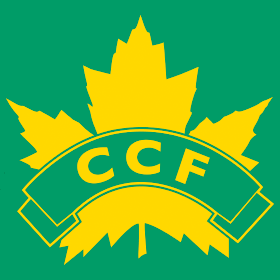
The Co-operative Commonwealth Federation (Manitoba) (CCF), known informally as the Manitoba CCF, was a provincial branch of the national Canadian party by the same name. The national CCF was the dominant social-democratic party in Canada from the 1930s to the early 1960s, when it merged with the labour movement to become the New Democratic Party. The Manitoba CCF, created in 1932, played the same role at the provincial level.
The Manitoba Reform Party was a right-wing political party in Manitoba, Canada in the early 1990s. It was known as the Manitoba Confederation of Regions Party (CoR) in the provincial elections of 1986, 1988 and 1990.
Doreen Lois Dodick is a former politician in Manitoba, Canada. She was a New Democratic Party member of the Legislative Assembly of Manitoba from 1981 to 1986.
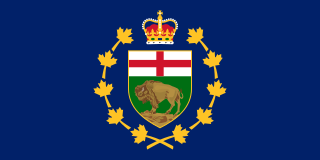
The lieutenant governor of Manitoba is the representative in Manitoba of the monarch, who operates distinctly within the province but is also shared equally with the ten other jurisdictions of Canada, as well as the other Commonwealth realms and any subdivisions thereof, and resides predominantly in his oldest realm, the United Kingdom. The lieutenant governor of Manitoba is appointed in the same manner as the other provincial viceroys in Canada and is similarly tasked with carrying out most of the monarch's constitutional and ceremonial duties. The present, and 26th, lieutenant governor of Manitoba is Anita Neville, who has served in the role since 24 October 2022.

The Province of Manitoba, similar to other Canadian provinces and territories, is governed through a Westminster-based parliamentary system. The Manitoba government's authority to conduct provincial affairs is derived from the Constitution of Canada, which divides legislative powers among the federal parliament and the provincial legislatures. Manitoba operates through three branches of government: the executive, the legislative, and the judicial. The executive branch—the Government of Manitoba—consists of the Executive Council and the Premier, who is the head of government and the President of the Executive Council. The legislative branch—the Manitoba Legislature—is composed of the Lieutenant Governor and the Legislative Assembly, which is composed of the 57 members (MLAs) elected to represent the people of Manitoba, as well as the Speaker, the Clerk, the Officers of the Legislative Assembly, and the employees of the legislative service.
Shannon Martin is a Canadian politician, who was elected to the Manitoba Legislative Assembly in a by-election on January 28, 2014. He represents the electoral district of McPhillips as a member of the Progressive Conservative Party of Manitoba.